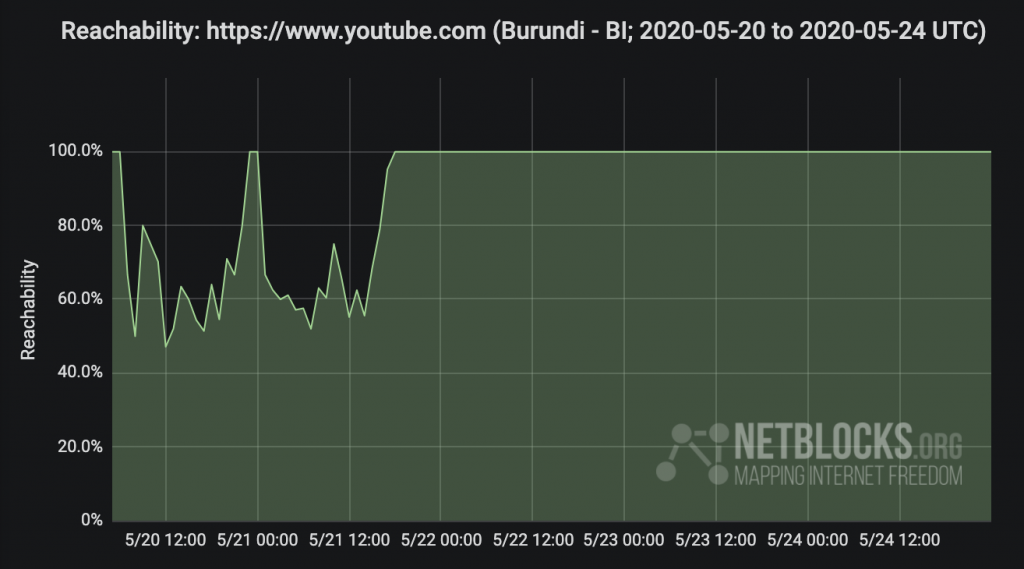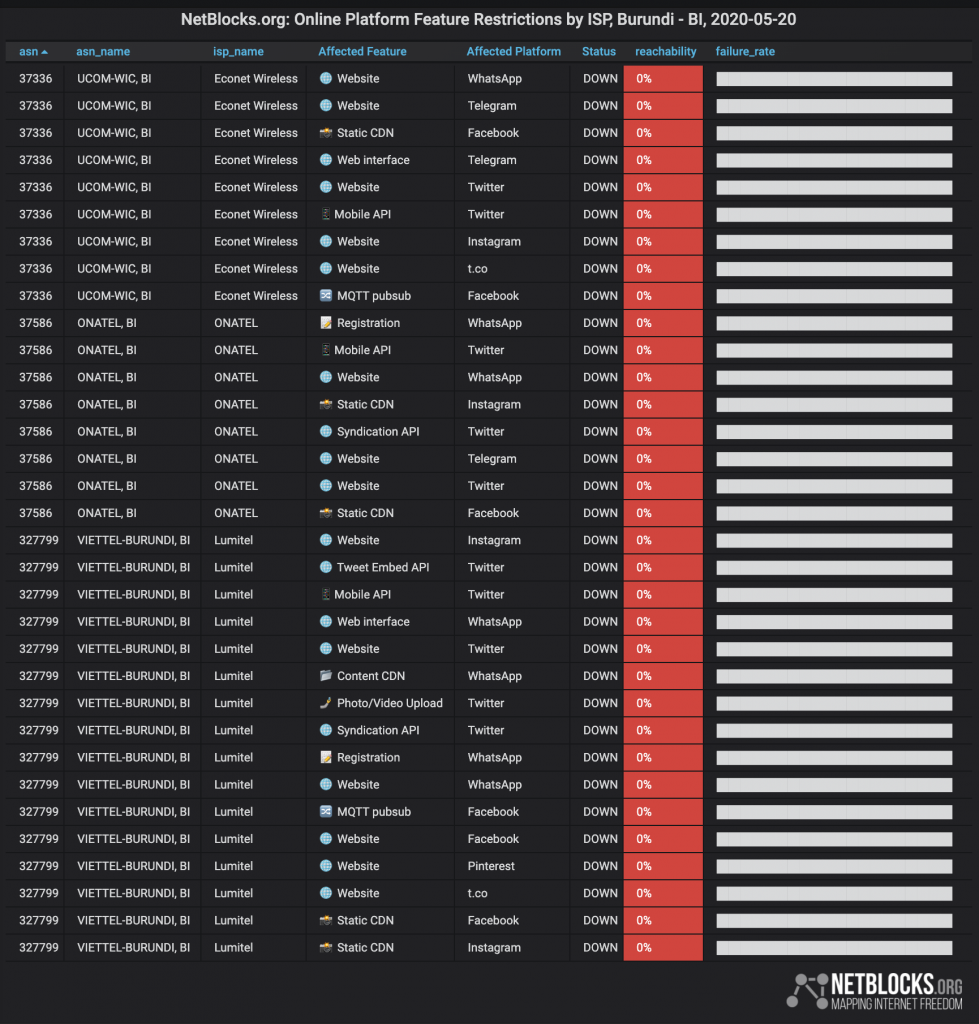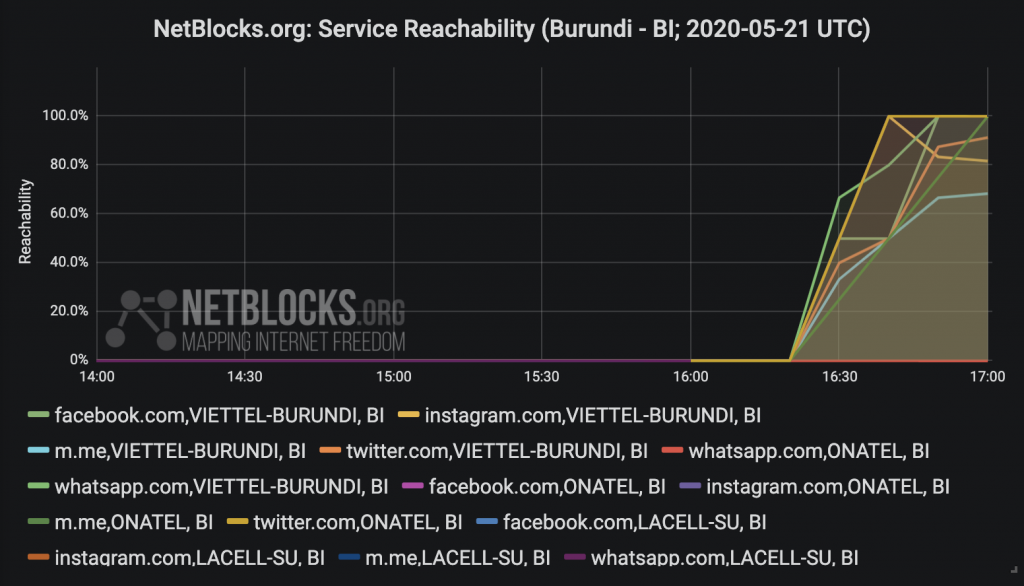Network data from the NetBlocks internet observatory confirm that social media and messaging apps are disrupted and unavailable in Burundi on the morning of Wednesday, 20 May 2020 as the country goes to elections.
Update: The restrictions are being lifted a day later as of Thursday, 6:30 p.m. local time. Users report being able to access affected services without using a VPN.
Confirmed: Access to social media and messaging apps being restored in #Burundi following two-day election media blackout; network data show services including Twitter, Facebook and WhatsApp were blocked on multiple providers as country went to vote ?
? https://t.co/lPlbogsFLZ pic.twitter.com/GUfvTqwAtT— NetBlocks (@netblocks) May 21, 2020
On Wednesday morning, Burundians reported problems with social media while members of the diaspora and journalists covering the polls noticed that WhatsApp messages had stopped reaching contacts within the country, sparking concerns that an internet shutdown had been imposed.
⚠️ Alert: Social media and messaging apps disrupted in #Burundi on election day; real-time network data show Twitter, Facebook, Instagram, Telegram and WhatsApp unavailable via leading network operators; incident ongoing ?
? https://t.co/lPlbogsFLZ pic.twitter.com/T9CGP2wPB8
— NetBlocks (@netblocks) May 20, 2020
Metrics show that Twitter, Facebook, Instagram and WhatsApp are restricted via Burundi’s leading providers Econet (AS37336), Lumitel (AS327799) and ONATEL (37586) corroborating widespread user reports. YouTube and Google video servers are also found to be restricted, though at times intermittently available.
Performance data indicate high latency in addition to the specific service failures listed. Initial findings are based on a set of 200 data points from 25 network/location pairings within Burundi, corroborating the disruption’s national impact. Facebook Messenger, Snapchat and an assortment of less known platforms appear in the list.
Meanwhile, ICMP diagnostics run against a representative, pseudorandom sample of Burundi’s IP address space confirm that the underlying connectivity remains generally available, with no indication of a full network shutdown.
What are the authorities saying?
In a Tweet posted 6:16 a.m. UTC, Willy Nyamitwe. Ambassador Extraordinary and Senior Advisor to President Pierre Nkurunziza, denied that the internet had been cut.
However, comments posted beneath the Ambassador’s tweet note that social media services work only when VPN software capable of circumventing internet censorship is activated.
How can users get back on social media?
VPN services are understood to be partially or fully effective in working around the platform restrictions at the present time. Investigations into the mechanism of disruption are ongoing.
Burundi joins Guinea, Togo, Benin, Malawi, Mauritania, Mali, Cameroon and other countries in the region that have faced internet shutdowns and social media blockades during elections.
Network disruptions impact transparency, free expression and civic engagement at critical moments for democracy. NetBlocks urges authorities and technical communities to ensure unrestricted access to communication services in keeping with international norms.

Further reading:
Independent press locked out of Burundi’s presidential election – Reporters Without Borders
Burundi goes to the polls as authorities clampdown on social media – RFI
C’est prouvé, les réseaux sociaux ont été coupés au Burundi – IWACU
Les réseaux sociaux débloqués, Iwacu reste inaccessible – IWACU
Burundi voted — but will the political situation change? – Global Voices
Interineti Yugawe ku Musi w’Amatora mu Burundi – Radiyoyacu
Burundians vote despite coronavirus outbreak – DW
Burundi bloquea las redes sociales y aplicaciones de mensajería en plena jornada electoral – EuropaPress
Présidentielle au Burundi : une élection sans connexion – Teknolojia
In Burundi durante le elezioni presidenziali è stato bloccato l’accesso ai social network – Il Post
Election présidentielle au Burundi : l’information indépendante confinée – RSF
Burundi : retour sur un triple scrutin sous tension – Afrik
Methodology
This report follows the NetBlocks Election Pathfinder Rapid Response methodology which defines a set of core principles, workflows and benchmarks for network measurement and evaluation during elections and referenda.
Internet performance and service reachability are determined via NetBlocks web probe privacy-preserving analytics. Each measurement consists of latency round trip time, outage type and autonomous system number aggregated in real-time to assess service availability and latency in a given country. Network providers and locations are enumerated as vantage point pairs. The root cause of a service outage may be additionally corroborated by means of traffic analysis and manual testing as detailed in the report.
NetBlocks is an internet monitor working at the intersection of digital rights, cyber-security and internet governance. Independent and non-partisan, NetBlocks strives to deliver a fair and inclusive digital future for all.
[ press | contact ] Graphics and visualizations are provided for fair use in unaltered form reflecting the meaning and intent in which they were published, with clear credit and source attribution to NetBlocks. Intellectual property rights are protected including but not limited to key findings, facts and figures, trademarks, copyrights, and original reporting, are held by NetBlocks. Citation and source attribution are required at the point of use.


